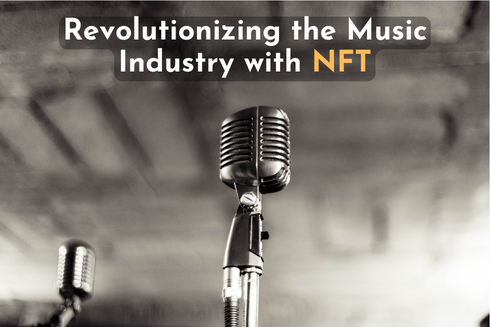Revolutionizing the Music Industry with NFT
Luvelylife | NFT - Revolutionizing the Music Industry with NFT Unlocking New Possibilities for Artists and Fans. In recent years, the world of Non-fungible Tokens (NFTs) has taken the digital landscape by storm, disrupting traditional industries and offering innovative solutions for creators and collectors alike. One industry that stands to be revolutionized by NFTs is the music industry. With their ability to establish provenance, enable direct artist-to-fan interactions, and create new revenue streams, NFTs have the potential to transform the way music is created, consumed, and valued. In this article, we will explore the impact of NFTs on the music industry, discussing the benefits they bring and the challenges they present. Join us as we delve into the exciting world where art and technology converge to shape the future of music.

Understanding NFTs in the Music Industry
- What are NFTs?
NFTs, or Non-fungible Tokens, are unique digital assets that are indivisible and cannot be exchanged on a like-for-like basis. Unlike cryptocurrencies such as Bitcoin or Ethereum, which are fungible, NFTs represent ownership of a distinct item, such as a piece of artwork, a collectible, or in this case, a musical composition or performance. NFTs are based on blockchain technology, which ensures transparency, security, and immutability. - The rise of NFTs in the music industry
The music industry has witnessed a significant surge in the adoption of NFTs. Artists, musicians, and industry professionals are recognizing the potential of NFTs to unlock new revenue streams, enhance fan engagement, and establish a direct connection with their audience. Early adopters such as Kings of Leon, Blau, and others have paved the way by releasing music as NFTs and achieving considerable success.
Empowering Artists and Creatives
- Artist autonomy and control
One of the key benefits of NFTs in the music industry is the empowerment they offer to artists. NFTs allow artists to retain ownership of their work and have more control over how it is monetized and distributed. By tokenizing their music, artists can establish a direct relationship with their fans and bypass traditional intermediaries such as record labels, streaming platforms, and distributors. - Enhanced fan engagement
NFTs enable artists to engage directly with their fans in unique and meaningful ways. Through NFT marketplaces and platforms, artists can offer exclusive experiences, merchandise, and limited-edition releases to their most dedicated supporters. This fosters a deeper connection between artists and fans, fostering loyalty and fan-driven promotion. - Creating new revenue streams
NFTs open up new avenues for artists to generate revenue from their music. By tokenizing music rights and royalties, artists can sell fractional ownership of their compositions or offer unique digital collectibles tied to specific songs or albums. Additionally, artists can participate in NFT auctions and benefit from secondary market sales, receiving a portion of the proceeds each time their NFTs are resold.
Establishing Provenance and Authenticity
- Combatting piracy and counterfeit music
One of the challenges faced by the music industry is piracy and the proliferation of counterfeit music. NFTs address this issue by providing a transparent and immutable record of ownership. Each NFT is uniquely identified on the blockchain, making it easy to verify the authenticity and provenance of a particular musical work. This helps protect artists' intellectual property rights and ensures that fans are purchasing genuine, authorized music. - Transparency in revenue sharing
NFTs offer a transparent mechanism for tracking and automating royalty payments. Smart contracts embedded within NFTs can automatically distribute royalties to artists, songwriters, producers, and other contributors based on predefined terms and conditions. This eliminates the need for complex licensing agreements and intermediaries, ensuring fair compensation for all parties involved.
NFT Challenges and Considerations
- Environmental impact and sustainability
One of the concerns surrounding NFTs is their environmental impact, particularly in terms of energy consumption. NFTs are currently built on blockchain networks that require significant computational power and consume substantial amounts of electricity. However, efforts are being made to explore greener alternatives, such as transitioning to more energy-efficient consensus mechanisms or utilizing eco-friendly blockchain networks. - Market volatility and sustainability
The NFT market has experienced significant volatility, with prices for certain assets skyrocketing and subsequently experiencing a downturn. This volatility raises concerns about the long-term sustainability of NFTs as an investment and revenue-generating mechanism. It is crucial for artists, collectors, and platforms to navigate this evolving market carefully, ensuring that artists' work is valued and protected in the long run.
Case Studies and Success Stories
- Kings of Leon's "When You See Yourself" album NFT release
Kings of Leon made headlines by releasing their latest album as an NFT, offering limited-edition tokens that provided unique perks to the holders, such as exclusive access to future concerts and special merchandise. The band successfully engaged their fanbase and generated significant revenue through the sale of these NFTs. - Blau's "Ultraviolet" album NFT auction
DJ and producer Blau made history by tokenizing his entire music catalog and auctioning it off as an NFT. This allowed him to monetize his music rights and royalties directly, creating a new model of ownership and enabling fans to invest in his music's success. The auction garnered substantial attention and set a precedent for the potential of NFTs in the music industry.
Looking Ahead: Future Implications and Possibilities
- Intersecting with virtual reality (VR) and augmented reality (AR)
The integration of NFTs with virtual reality (VR) and augmented reality (AR) technologies opens up exciting possibilities for immersive music experiences. Artists can create virtual venues, where fans can attend concerts, interact with each other, and purchase digital collectibles related to the event. This convergence of music, art, and technology can reshape the live music landscape. - Collaborative NFT projects and cross-industry partnerships
The NFT revolution extends beyond the music industry, with collaborations between musicians, visual artists, fashion brands, and even gaming companies. These cross-industry partnerships offer new avenues for creative expression and monetization. By leveraging the unique attributes of NFTs, artists can explore innovative ways to engage with their audience and expand their artistic horizons.
Conclusion
As NFTs continue to gain traction in the music industry, the possibilities for artists, fans, and the industry as a whole are expanding. From empowering artists with more control and revenue opportunities to providing fans with unique experiences and collectibles, NFTs are revolutionizing the way music is valued, consumed, and enjoyed. However, challenges such as environmental concerns and market volatility must be addressed to ensure the long-term sustainability and inclusivity of NFTs in the music industry. As we look ahead, the convergence of art and technology presents exciting prospects for the future of music, where innovation and creativity thrive in harmony with digital advancements. The NFT revolution is underway, and the music industry is poised to embrace its transformative power.

Post a Comment for "Revolutionizing the Music Industry with NFT"